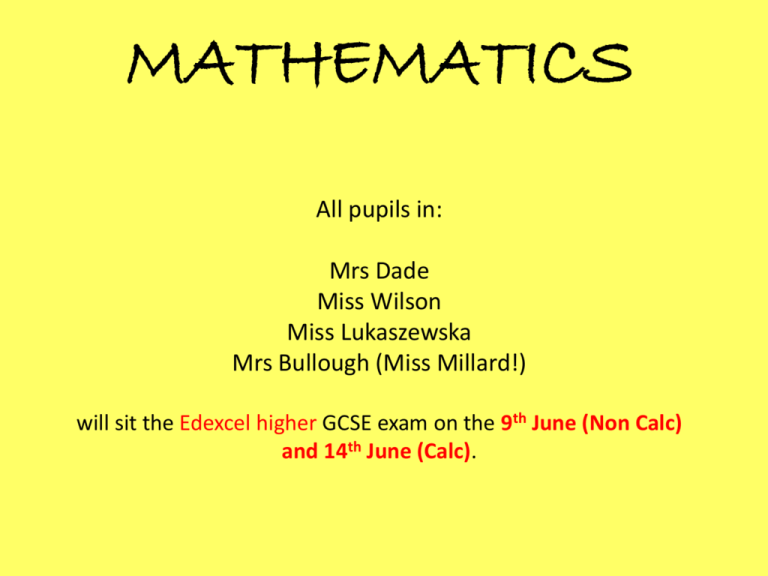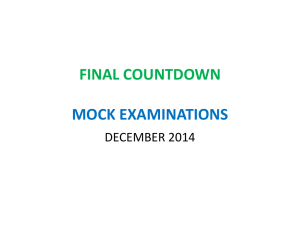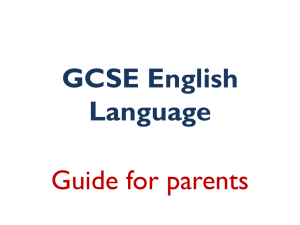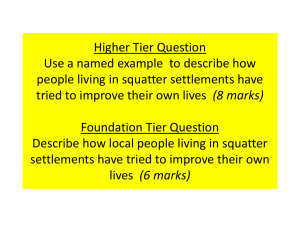Prospective Parents Evening Presentation
advertisement

MATHEMATICS All pupils in: Mrs Dade Miss Wilson Miss Lukaszewska Mrs Bullough (Miss Millard!) will sit the Edexcel higher GCSE exam on the 9th June (Non Calc) and 14th June (Calc). All pupils in: Miss Harrison Mr Whitmore Mrs Rennie Miss Pettit Mrs Terry will sit the OCR Foundation GCSE exams on the 26th May (Non Calc) and 9th June (Calc). A small group of students may be selected to sit the Edexcel level 2 Certificate (IGCSE) following mock exam results. This is equivalent to a GCSE. What support is available • Revision sessions - Every Monday night until 4:00pm (currently just for those sitting an exam in November) • Revision guides and workbooks available to buy • Maths Watch • My Maths – online maths revision website available for all pupils to access at home • Past exam papers covered in lessons & homework • Any questions / concerns do not hesitate to contact Mrs Bullough Tips for getting the best grade possible: -Bring your calculator to every lesson and know how to use it. - Have a mathematical equipment set and know how to use it. -Listen to the advice your teacher gives you – they know best! - Show all working out even on a calculator paper Tips for getting the best grade possible: -Attempt all questions - Revise - Ask for help when you get stuck - Do your homework! What topics to revise There are hundreds of topics you are expected to know for your GCSE so which ones should you revise? Our advice is to ensure you understand how to move the ambers to green. This shouldn’t need much work Once this is complete pick a red topic to revise. This should be one which you should be able to do but can’t YET. (I would recommend the one closest to the top of the page as this is usually the easiest) Continue until you understand all questions on the paper. Remember it is OK to ask for help. This will be repeated after every exam paper ENGLISH LANGUAGE How to approach the reading section of your PPE exam THE IMPORTANCE OF READING SKILLS AQA (sets 1,2,3,4,7,8,9) iGCSE (sets 5 and 6) The reading section is worth 50% of the marks available in the exam 80% of the iGCSE exam marks are reading WHAT THE EXAM WILL LOOK LIKE AQA – question 3 iGCSE – question 3 Exemplar question 1 (8 marks) Exemplar question 3 (15 marks) From the text, what do you learn about the importance of walking? What are the benefits of walking and what is the advice given to improve fitness, according to the passage? TASK Look at the non-fiction source that you have been given on your tables. Read through the source as a group and highlight any parts of the source that can help you to answer the exemplar exam questions above HOW CAN YOU IMPROVE YOUR READING? Regular reading Non-fiction reading Summarising what you have read Regular reading for enjoyment READING FOR ENJOYMENT 10 to 16 year-olds who read for pleasure do better at school. (2013 research by Dr Alice Sullivan and Matt Brown from the Institute of Education) Parents are the most important reading role models for children and young people. (National Literacy Trust, Reaching Out with Role Models, April 2009) Reading books is the only out-of-school activity for 16-year-olds demonstrably linked to securing managerial or professional jobs. (Skills for Life Survey: Headline findings, Department for Business Innovation and Skills, 2011) It can reduce stress levels by 68%. (Centre for Economic Performance's Mental Health Policy Group, 2012) AQA – WRITING SECTION The writing section of the exam is worth 50% and comprises of 2 extended response questions Key preparation Revise and understand how to approach different writing purposes Make sure you are aware of the purpose of your writing Vary your vocabulary Remember your basics THE IMPORTANCE OF TIMINGS AQA iGCSE For each mark on the exam paper you have 1 minute and 30 seconds For each mark you have 2 minutes You should plan how you are going to use your time before you enter the exam. E.g. You should plan how you are going to use your time before you enter the exam. E.g. Q1 – 12 minutes for 8 marks Q2 – 12 minutes for 8 marks Q1 – 40 minutes for 20 marks Q3 – 12 minutes for 8 marks Q2 – 20 minutes for 10 marks Q4 – 24 minutes for 16 marks Q5 – 24 minutes for 16 marks Q6 – 36 minutes for 24 marks This plan will leave you with 15 minutes spare for reading, highlighting and annotating your sources and checking your work Q3 – 40 minutes for 20 marks This plan will leave you with 20 minutes spare for reading, highlighting and annotating your sources and checking your work The Apps, Exam Board and other useful ideas Mrs Sexsmith Core or Additional • Exam format Useful Science links. OCR Science: • http://www.bbc.co.uk/education/subjects/zrkw2hv • General Science: • http://www.memrise.com/courses/english/maths-science/ • http://revisionworld.co.uk/gcse-revision Revision: • http://getrevising.co.uk/resources/level/gcse/subjects/science • http://www.s-cool.co.uk/ Is there an APP for that? Revision Guides • Revision sections • Level Ladders for each section • Questions for each section • Revision sessions, a timetable Will be published after ½ term on the run up to mocks – every Wednesday night What we provide • Sam learning • Revision packs containing revision mats and past papers • Each student has been provided with a free revision guide • Tests take place each ½ term and students progress and predicted grades focus on these results. Around the end of every ½ term students should be looking at show my homework and completing revision materials provided








